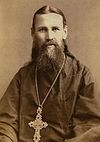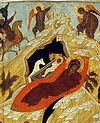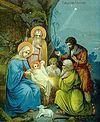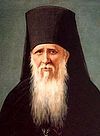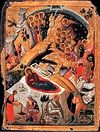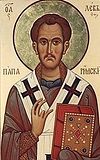

| Previous day | Next day |
| Old Style
December 25
|
Sunday |
New Style
January 7
|
| 31st Sunday after Pentecost. Tone 6. | No fast.
|
![]() The Nativity according to the Flesh of Our Lord, God, and Savior Jesus Christ.
The Nativity according to the Flesh of Our Lord, God, and Savior Jesus Christ.
The Adoration of the Magi: Melchior, Caspar, and Balthasar. Commemoration of the shepherds in Bethlehem who were watching their flocks and came to see the Lord. Massacre of Monk-martyr Jonah, and with him 50 monks and 65 laymen, at St. Tryphon of Pechenga Monastery, by the Swedes (1590).
Thoughts for Each Day of the Year
According to the Daily Church Readings from the Word of God
By St. Theophan the Recluse

The Nativity of the Lord. [Gal. 4:4–7; Mt. 2:1–12]
Glory to Thee, O Lord! Once again we greet the awaited bright days of Christ’s Nativity. Let us be glad and rejoice. In order to raise our festivities to a higher level in these days, the Holy Church has intentionally instituted a preceding fast—a certain amount of difficulty, so that when we enter the festive period we might feel as though liberated. Nevertheless, the Church in no way desires that we should give ourselves over to purely sensual delights and fleshly pleasures. Since the Church has from olden times called these days sviatki, or the “holy days,” these days require that our very festivity be holy, as they are holy. So that those who rejoice might not forget themselves, the Church has placed a short song upon our lips to glorify the born Christ, by which the flesh is restrained and the soul is uplifted, showing the proper occupations for these days. It says, “Christ is Born, give ye glory,” and the rest. Glorify Christ; glorify Him, so that by this glorification the heart and soul would delight, and thereby silence any urge for various other deeds and occupations that might promise certain consolations. Glorifying Christ does not mean devising lengthy songs of praises to Christ. But if when contemplating or hearing about the birth of Christ the Savior you involuntary shout from the depths of your soul, “Glory to Thee, O Lord, that Christ is born!”—this is sufficient. This will be a quiet song of the heart, which nevertheless reaches the heavens and enters in to God Himself. Repeat a little more clearly to yourself what the Lord has wrought for us, and you will see how natural this exclamation now is. So that this might be easier for us, we shall compare it to the following incident.
A king promised freedom to a man who was imprisoned in a dungeon and bound with fetters. The prisoner waits a day, then another, then months, and years. He sees no fulfillment of the promise, but does not lose hope, and believes in the king’s words. Finally, he sees signs that it is coming soon, his attention increases—he hears a noise; some one is approaching with cheerful words. Now the locks fall and the liberator enters. “Glory to Thee, O Lord!” the prisoner involuntarily cries. “The end of my imprisonment has arrived, and soon I will see God’s world!” Or another incident: A sick man is covered with wounds and paralyzed in all his members. He has tried all medicines and various doctors. His endurance is exhausted, and he is ready to give himself over to despair. He is told, “There is one very skilled doctor who heals everyone from those very illnesses that you have. We have asked him to come, and he has promised to do so.” The patient believes them, cries out in hope, and waits for the promised one…. One hour passes, then another, and his soul is tormented with anxiety. Finally, at evening, someone arrives…. The door opens, and the desired one enters…. “Glory to Thee, O Lord!” the sick man shouts.
Here is another example. A thundercloud hangs over the sky, and the face of the earth covered with darkness. Thunder shakes the foundations of the mountains and lightening tears the sky from one end to the other. All are in fear, as if the end of the world had come. When the thunder passes and the sky clears, everyone breathes freely, saying, “Glory to Thee, O Lord!”
Bring these examples closer to yourself and you will see our whole history in them. The threatening clouds of God’s wrath were over us. The Lord has come—the peacemaker, and has dispersed that cloud. We were covered with wounds of sins and passions; the healer of souls and bodies has come and healed us. We were bound by the fetters of slavery; the liberator has come and released our fetters. Bring all of these examples closer to your heart and take them in with your senses, and you will not be able to refrain from exclaiming, “Glory to Thee, O Lord, that Christ is born!”
I will not try to convey this joy to you in words; it is unreachable by any words. The work that the Lord Who is born has wrought touches every one of us. Those who enter into communion with Him receive from Him freedom, healing, and peace; they possess all of this and taste of its sweetness. There is no reason to say “rejoice” to those who experience this within themselves, for they cannot help but rejoice; but to those who do not experience it, why say “rejoice”? They cannot rejoice. No matter how much you say “rejoice” to one bound hand and foot, he will not rejoice. From whence can the joy of healing come to one who is covered with the wounds of sins? How can one who is threatened by the thunder of God’s wrath breathe freely? You can only say to him, “Go to the Infant wrapped in swaddling clothes in the manger, and seek deliverance by Him from all the evils that encompass you, for this Infant, Christ, is the Savior of the world.”
I would like to see everyone rejoicing with this very joy, and not wanting to know any other joys; but not everything that comes from Israel is Israel. Festivities will now begin that are empty, wild, and inflaming of the passions: the lust of the eyes, smoking, costume-wearing.[1]My soul hateth … your solemnities: they are become troublesome to me, I am weary of bearing them (Is. 1:14)! Truly, many of our social festivities are really pagan abominations; that is, some of them are brought to us straight from the pagan world, while others, though they appeared later in time, are penetrated with the spirit of paganism. And they come out as if on purpose in great quantities for the feasts of Christmas and Pascha. By getting caught up in them we give the prince of this world, our tormentor, the enemy of God, an excuse to say to God, “What have You done for me with Your Nativity and Resurrection? They are all coming to me!” But let the words of the fiftieth Psalm be repeated more often in the depth of our hearts: That Thou mightest be justified in Thy words, and prevail when Thou art judged (Ps. 50:4). No matter how much you tell these people to stop, they only shut their ears and pay no heed; they bring these bright days of the feast to such an finale that the Lord is compelled to turn His eyes from us and say,
We are interested in enlightened Europe. Yes, the abominations of paganism that were cast out of the world were first restored there; they are passing from there to us. Having breathed in that hellish poison, we run around like madmen, forgetting our own selves. But let us remember the year of 1812—why did the French come to us then? God sent them to wipe out all the evil that we had learned from them. Russia repented then, and God had mercy on her. But now it seems that we have forgotten that lesson. If we come to our senses, of course, nothing will happen. But if we do not come to our senses, who knows? Perhaps the Lord will again send similar teachers, so that they would bring us to our senses and place us on the path of correction. Such is the law of God’s righteousness: to cure someone from sin with the thing that enticed him into it. These are not empty words, but a matter that has been confirmed by the voice of the Church. Know, ye Orthodox, that God will not be mocked; and know, ye who make glad and rejoice on these days with fear. Illumine the bright feast with bright deeds, occupations, and festivities, so that all who look upon us will say, “They have holy days, and not some wild games with the unrighteous revellers who do not know God.
[1] St. Theophan coins the word oborotnichestvo, (from the word oborotni, meaning “werewolf”) here, which refers to a strange entertainment in Russia during the Christmas holidays that resembles American Halloween. Young people dress as ferocious animals like wolves and bears, and make pranks. The use of this word also implies that this practice is something from the realm of witches and sorcerers.

